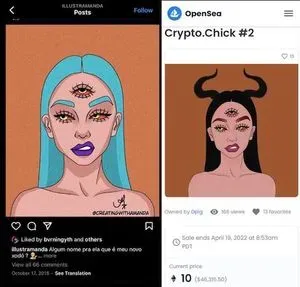An hour and a half after users began to report missing NFTs, OpenSea finally acknowledged the issue. They tweeted that they were "actively investigating rumors of an exploit associated with OpenSea related smart contracts", and wrote that they believed it was a phishing attack coming from outside of OpenSea, rather than an issue with their contract. It was later determined that an attacker had successfully phished 17 OpenSea users into signing a malicious contract, which allowed the attacker to take the NFTs and then flip them. Bizarrely, the hacker returned some of the NFTs to their original owners, and one victim inexplicably received 50 ETH ($130,000) from the attacker as well as some of his stolen NFTs back. The attacker later transferred 1,115 ETH obtained from the attack to a cryptocurrency tumbler, worth around $2.9 million.
Seventeen OpenSea users have their NFTs stolen and flipped for a total of $2.9 million by a phishing scammer
Former owner of a reportedly stolen Bored Ape files million-dollar lawsuit against OpenSea
- McKimmy v. OpenSea on CourtListener
- Etherscan records for the Bored Ape NFT
Crypto.Chicks team member gives a non-apology for blatantly copying the work of another artist
The following day, Crypto.Chicks announced that they would be replacing Polly as a team member, and pausing their planned release of another NFT collection that also appeared to contain stolen artwork.
Appeals court allows legal claim to continue against online promoters of Bitconnect
Authorities raid Generación Zoe, an Argentine pyramid scheme propped up by cryptocurrencies
- "Detuvieron al contador de Generación Zoe", Página 12 (in Spanish)
- "Pierri será el abogado de Leonardo Cositorto, CEO de Generación Zoe", Infobae (in Spanish)
- "Estafas: qué es Generación Zoe y quién es Leonardo Cositorto", Clarín (in Spanish)
- "A bitcoiner against a powerful cryptocurrency pyramid from Argentina", Money Training Club
Kickstarter says they "won't make changes to Kickstarter without you" after blockchain backlash... but they will continue with blockchain plans
Kickstarter's COO, Sean Leow, did an interview with The Beat to discuss the announcement. He seemed to be a little bit confused on the whole concept throughout, and seemed to believe that "open source" is some sort of competing idea to blockchains. At one point he stated, "We believe that that data can be structured in a way through a blockchain where it ... can move in a much more efficient and effective way between services ... in a way that open source doesn't allow". Later in the interview he spoke about governance, saying, "our understanding is that [governance] is done more effectively with blockchain then with open-source."
Someone blows up a Lamborghini to "criticize greed", then makes NFTs out of the pieces
SHL0MS then gathered 888 pieces of the wrecked car, took rotating videos of each one, and created NFTs from them. The NFTs were to be released on February 25 in an auction starting at 0.01 ETH (about $26), but the auction was delayed due to the news of Russia's military invasion of Ukraine.
It's likely SHL0MS will profit handsomely off the Lamborghini NFT. Their previous NFT collection, FNTN, involved similar rotating videos, in that case of an exploded toilet. The NFTs in that 185-piece collection have recently been trading at 1–2 ETH (several thousand dollars).
Andrew Yang announces plans to fight poverty with a lobbying group that distributes voting power in proportion to how much you pay
Interestingly, one of the people credited as a "contributing artist" to Lobby3 is "Robness", who had the previous day minted an NFT of a photo of a journalist as a child in an attempt to harass her.
Class action lawsuit names SafeMoon, its executives, Jake Paul, Nick Carter, and others in alleged pump-and-dump scheme
These influencers join a growing list of celebrities who have been named in class action suits over alleged pump-and-dumps. The list includes names like Kim Kardashian, who was named among others in a January class action suit pertaining to a coin called EthereumMAX.
- "Jake Paul, Nick Carter, Soulja Boy, Lil Yachty Facing ‘Pump and Dump’ Class Action Over SafeMoon Tokens", ClassAction.org
- "I UNCOVERED A BILLION DOLLAR FRAUD", CoffeeZilla's YouTube channel










